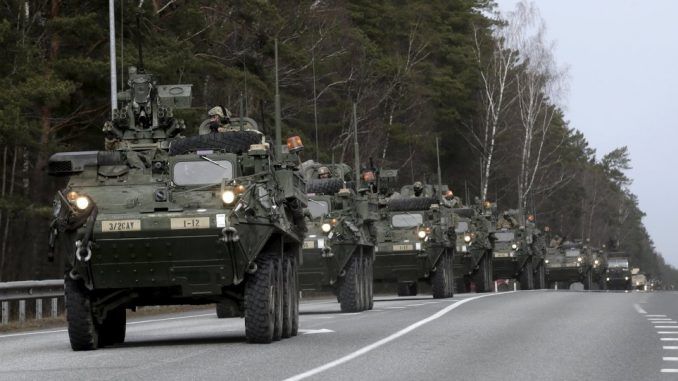
NATO have agreed to enhance its military presence on Russia’s border, in the largest buildup since the Cold War.
Secretary General Jens Stoltenberg told a summit of members in Warsaw that NATO will enhance its military presence in the eastern part of the alliance.
“We will deploy four robust, multinational battalions to Estonia, Latvia, Lithuania and Poland. I welcome Canada’s recent announcement that it will lead one of these four battalions,” Stoltenberg said.

BYPASS THE CENSORS
Sign up to get unfiltered news delivered straight to your inbox.
You can unsubscribe any time. By subscribing you agree to our Terms of Use
Rt.com reports:
‘Doubled’ #NATO activity on Russian borders forces Moscow to respond – Russian MoD https://t.co/v0RpbN5U0T pic.twitter.com/h7jY9KB63M
— RT (@RT_com) June 30, 2016
“We will also agree to develop a tailored presence in the southeast, based on a multinational brigade in Romania,” he added.
NATO’s collective defense will be enhanced further through the recognition of cyberspace “as an operational domain, alongside air, land and sea,” Stoltenberg said, adding that the ‘Cyber Defense Pledge’ will increase the alliance’s resilience.
A new Intelligence Division within NATO Headquarters will help to make the “right decisions at the right time” and will counter modern challenges including meeting “hybrid and terrorist threats,” Stoltenberg said.
NATO is also preparing to boost spending on defense.
“We expect a real increase of 3 percent in defense spending by European allies and Canada. This amounts to $US8 billion,” Stoltenberg said, specifying that 22 allies will increase military expenditure in real terms.
Another topic of the NATO summit will be “stability beyond our borders,” the secretary general said.
“When our neighbors are more stable, we are more secure,” he said, including Iraq as a NATO “neighbor” that is in need of help against Islamic State (IS, formerly ISIS/ISIL), and identifying Afghanistan as the alliance’s “largest operation” until at least 2020.
#Putin calls out #NATO’s 'insecurity agenda' (Op-Ed by Finian Cunningham) https://t.co/rvVJiHsoIf pic.twitter.com/7Xzbr9rbc8
— RT (@RT_com) June 23, 2016
An independent and stable Ukraine will remain the “key to Euro-Atlantic security,” and NATO has resolved to make sure that a law-abiding Kiev is “committed to democracy,” Stoltenberg said.
Assistance will also be provided to Georgia and Moldova “to resist outside pressure and to advance reforms.”
The alliance’s secretary general stressed that NATO remains open to dialogue with Russia.
“The NATO-Russia Council has an important role to play as a forum for dialogue and information exchange, to reduce tensions and increase predictability,” Stoltenberg said, revealing that the alliance is discussing with Moscow another meeting of the Council “shortly after” the Warsaw summit.
#NATO aims to feed fears by painting Russia as ‘treacherous enemy’ – Russian MoD https://t.co/XXO7Qnhy80
— RT (@RT_com) June 16, 2016
NATO’s strengthening of its “eastern flank” will be on the agenda of the Russia-NATO Council meeting, Deputy Foreign Minister Aleksey Meshkov said in a statement.
Russian Defense Minister Sergey Shoigu recently pointed at the fact that NATO activity on Russia’s doorstep has “more than doubled” lately, forcing Russia to take retaliatory measures.
“Such moves of our Western colleagues lead to erosion of the strategic stability in Europe and force us to take counter measures, primarily in the western theater of operations,” Shoigu said, adding that Russia is taking action aimed at strategic deterrence in the western military district to “neutralize potential threats.”
Russian President Vladimir Putin recently promised to take countermeasures against NATO’s “aggressive rhetoric” and called for the creation of an international security system open to all countries.


Be the first to comment